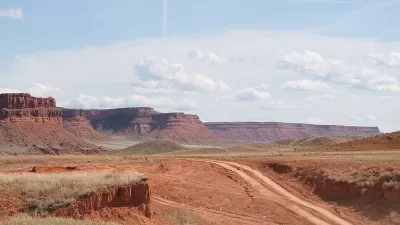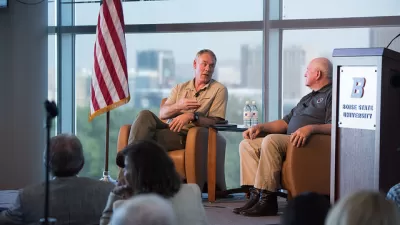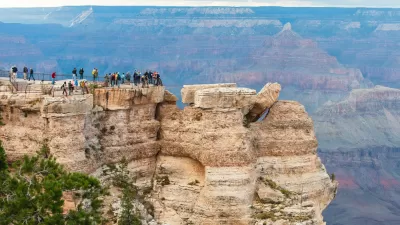After recent resignations, there's a new part of the job description: "maintain a sort of firewall between their scientific work and any political agendas."
In a recent hearing on the nomination of geologist and former astronaut James Reilly to lead the United States Geological Survey, congress members "emphasized that Reilly would have to protect the scientists in his agency and maintain a sort of firewall between their scientific work and any political agendas," reports Francie Diep at Pacific Standard.
It was an unusual line of questioning that stems from the resignation last month of two USGS scientists after they were asked to provide data from a study to leaders of the Department of the Interior (which houses the USGS) in advanced of its public release.
Diep spoke to leaders of the scientific community.
"'I would not say they have ever been asked to be some sort of buffer or barrier between the [Department of the Interior] and scientists ever before,' says Lexi Shultz, vice president of public affairs for the American Geophysical Union, a professional group for Earth scientists. The union estimates that a bit less than 600 of its members work for the USGS. 'That is not something that we have seen,' Shultz says."
Though, typically, it has taken President Trump an exceptionally long time to fill the top position at the USGS, Reilly's nomination attracted comparably little controversy, most likely because he is one of the administration's few nominees to lead a scientific agency who actually has an advanced degree in science.
If Reilly is approved, he will report Department of the Interior Secretary Ryan Zinke, who is more of "a typical Trump appointee," as Elizabeth Kolbert wrote, in that "[n]early all Trump’s Cabinet members have shown disdain for the regulatory processes they’re charged with supervising."
Still Reilly's response to the committee's questions are "hard to read," Diep writes; interpretations have varied from "USGS nominee vows to insulate science from political pressure" to "USGS nominee inclined to show data to Interior bosses."
FULL STORY: THE USGS DIRECTOR'S NEWEST JOB DESCRIPTION: MAINTAINING 'SCIENTIFIC INTEGRITY'

Planetizen Federal Action Tracker
A weekly monitor of how Trump’s orders and actions are impacting planners and planning in America.

Maui's Vacation Rental Debate Turns Ugly
Verbal attacks, misinformation campaigns and fistfights plague a high-stakes debate to convert thousands of vacation rentals into long-term housing.

Restaurant Patios Were a Pandemic Win — Why Were They so Hard to Keep?
Social distancing requirements and changes in travel patterns prompted cities to pilot new uses for street and sidewalk space. Then it got complicated.

In California Battle of Housing vs. Environment, Housing Just Won
A new state law significantly limits the power of CEQA, an environmental review law that served as a powerful tool for blocking new development.

Boulder Eliminates Parking Minimums Citywide
Officials estimate the cost of building a single underground parking space at up to $100,000.

Orange County, Florida Adopts Largest US “Sprawl Repair” Code
The ‘Orange Code’ seeks to rectify decades of sprawl-inducing, car-oriented development.
Urban Design for Planners 1: Software Tools
This six-course series explores essential urban design concepts using open source software and equips planners with the tools they need to participate fully in the urban design process.
Planning for Universal Design
Learn the tools for implementing Universal Design in planning regulations.
Heyer Gruel & Associates PA
JM Goldson LLC
Custer County Colorado
City of Camden Redevelopment Agency
City of Astoria
Transportation Research & Education Center (TREC) at Portland State University
Jefferson Parish Government
Camden Redevelopment Agency
City of Claremont





























